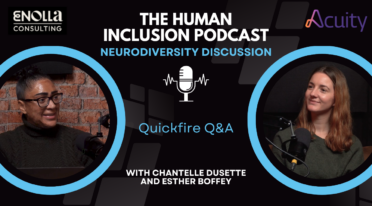Diversity at work: Why tech start-ups have more to gain
Written by Esther Boffey, D&I Lead
We are delighted to share the first edition of our ‘In conversation with’ series, where we speak to senior people at forward thinking companies about the pressing talent challenges, they face in the world of work.
We recently had the pleasure of speaking with Elizabeth Wallace, Head of Portfolio Talent at Hg, about Diversity and Inclusion in the PE sector and her experience of helping tech start-ups build high performing, diverse teams, as they scale.
Acuity’s D&I lead, Esther Boffey, shares the key takeaways from the conversation below, but first, here’s a little about Hg and Elizabeth…
The private equity firm Hg is one of the largest tech investors in Europe, with a portfolio of over 40 companies. It only invests in high-growth businesses and most of the portfolio consists of software companies – anything from small to large-cap. Elizabeth moved to Hg from BlackRock in 2019 and her role now focusses on C-Suite and board-level appointments as well as talent assessment and development across the portfolio.

In conversation with Elizabeth Wallace, Head of Portfolio Talent, Hg
When it comes to hiring and developing people, both start-ups and large corporates face many of the same challenges. Building and retaining a cohesive, diverse leadership team (particularly in a candidate short market) is one such challenge. However, I believe start-ups have immeasurable rewards to gain if they pay close attention to their hiring practices and prioritise diversity and inclusion early on.
To discuss the D&I talent challenges faced by the PE sector and tech start-ups, I spoke with Elizabeth Wallace, Head of Portfolio Talent at private equity firm Hg. Here are the key takeaways from my interview…
The PE sector is on a diversity journey
I started my interview by asking Elizabeth about the state of Diversity and Inclusion in the PE sector. Elizabeth shared, that like most industries, the PE sector does not have proportionate representation from minorities and is on a diversity journey of its own.
“The PE sector is still very much learning about D&I. It is behind when you compare the sector to Banking, Insurance or Asset Management. But that doesn’t mean those sectors have it all figured out either. It’s a long journey and there are no quick fixes.”
“One of the key challenges is that experience in a deals environment is one of the key factors when hiring. The pool of people who have experience of doing the job is limited to a very homogenous, white, male dominated group. There’s a severe lack of socio-economic diversity across the industry as there’s previously been a focus on things like which university someone went to, or their internship experience. We can slowly see a change here with the start of new graduate programmes and a conscious change to process, but it’s going to take a long time.”
“At Hg we have the additional challenge that we work mostly with software companies, which is very much a male dominated industry.”
PE investors influence change downstream
So, PE investors, like most businesses in every industry, have work to do when it comes to Diversity and Inclusion. Thankfully, Elizabeth says that their influence is set to expedite change further downstream.
Investors increasingly will only consider businesses who put their relationships with their workforces and the societies in which they operate first. In the next few decades, we will see the largest generational wealth transfer in history with an estimated USD30 trillion from Baby Boomers to Millennials. This will mark an important milestone for investment where millennials filter through a sense of responsibility to concentrate investments on companies that are socially, ethically and environmentally responsible. This includes having a diverse workforce and an inclusive workplace.
“What we are starting to see, is that increasingly investors are making D&I a requirement and they won’t invest in companies that don’t have a diverse workforce. This is a trend which started in the US and is now filtering down to the UK.”
“The need for start-ups to secure investment will be a huge impetus for change. I’m not saying the driving force behind this change (money) is the right reason, but it will certainly bring diverse and inclusive recruitment practices into focus.”
Start-ups face more complexity when it comes to People, Processes and Systems
I asked Elizabeth about the common talent challenges faced by the companies in the Hg portfolio and what her team does to support them. There’s was no getting away from it, unsurprisingly it all comes down to investment in People, Process and Technology…and in that order!
“Companies on the smaller-end tend to be the most complex on the People side. They are often founder owned, and the founder is still active in the business. They will have experienced business growth for several years and now require investment to scale. This requires organisational design, a management team with different skills and investment in new processes and systems.
“Often, many of these companies don’t have an operations board, a People function or HR system. Where an HR system is in place, it’s often not fit for purpose and doesn’t include process around promotion, development, or retention. This is exactly where my team come in. Working closely with our ESG colleagues on initiatives around D&I and sustainability, we help portfolio companies build and retain high-performing teams, while also ensuring that they have the most effective processes and systems in place to grow.”
The reality for start-ups and nepotism
It’s well documented that hiring individuals, from different backgrounds, means being able to harness the power that ‘diversity of thought’ brings to strategic decision making, thus avoiding ‘group think’.
However, it’s fair to say that many start-ups commence with founders giving friends, ex-colleagues, or relatives jobs. This is pretty much the definition of nepotism. But of course, this is the most common sense and natural thing to do when the ability to attract talent is very limited and cash is tight!
However, once a start-up has recruited its first handful of members, I believe it must consciously start to hire outside of personal networks with diversity in mind. This means proactively finding board and leadership team members from completely different backgrounds.
Cognitive diversity is not just a nice to have; it’s a must. It’s a core ingredient for successfully scaling up. The competitive advantage it brings to a board or leadership team translates to subsequent hiring decisions as the company grows. On the other hand, if allowed to persist nepotism (or perceived nepotism) can cause trust issues to arise and staff turnover to begin.
It was refreshing to hear, that in Elizabeth’s experience, nepotism isn’t an issue when tech start-ups hire leaders beyond their initial founding members. However, she did point out that it can re-surface when it comes to hiring mid-level and junior roles, as the need for speed often trumps diligence around diversity hiring.
“Nepotism is common in start-ups as they recruit founding members but when we hire past that, at the board or leadership level for companies in our portfolio, this is rarely a concern. Business leaders increasingly understand the need to balance skills, experience and background at this level and are prepared to invest the time and resource into attracting the right expertise that will complement and add to existing skill-sets.”
“However, we do see it surface at the mid-level to junior roles. It’s hard for smaller companies to balance budget and the need for speed with diversity hiring. Start-ups must ensure that they apply the appropriate inventions and practice inclusive recruitment no matter the seniority level of the role.”
To recruit for difference, interventions must be applied throughout the hiring process
It’s no secret, that even with the best intentions, unconscious biases creep into hiring decisions and undermine efforts to recruit for difference. I believe that every step of the recruitment process (no matter the shape and size of the organisation) should be consciously inclusive. Being aware of unconscious bias and understanding where they are likely to surface is half the battle to allowing diversity to thrive and Elizabeth concurs…
“I believe when it comes to hiring the whole picture is important. Do we have a diverse interview panel, do we have diverse slates, are we challenging our portfolio companies on their hiring, are we having the right conversations at management and at board level and are we making sure interventions lead to positive change are all questions that are vital to ask.”
“Ultimately the portfolio company decides, and diverse candidates don’t always have the same set of experiences, but it is important that we have the debate with the hiring managers to decide what good looks like, and that we provide the right support to every hire coming in.”
Search & recruitment firms have a key role to play
At Acuity, we know that we have a vital role to play when it comes to furthering Diversity and Inclusion in the world of work. Behind our purpose to relentlessly connect brilliant people sits a commitment to always confront our perception of ‘the best’. Being aware of our own biases and challenging our clients on theirs sits at the heart of our diversity, equity and inclusion commitment.
“Search and recruitment agencies talk with a lot of people and have much bigger networks so they can bring a lot of knowledge to the conversation. I think in their partnership with in-house teams or HR it is about creating that dual approach in pushing the D&I agenda forward.”
“It’s important that agencies bring the right logical arguments as to why companies would want to further D&I. I have a background in agency work myself and I know at times you may think that the hiring manager knows more, but this is not always true. If you are able to provide your views and expertise in a convincing matter, then there is a lot to gain.”
Key considerations for start-ups
It’s clear to me that if a business proactively hires leaders from different backgrounds, at the earliest possible stage, the rewards of doing so are transferred down, through subsequent hiring decisions, as the company grows. This provides an immediate and long-lasting competitive advantage over companies that don’t, or haven’t prioritised hiring with diversity in mind, from the very start.
So, what are the key considerations / interventions for start-ups when it comes to building a diverse leadership team?
Contact me if you would like a copy of our Inclusive recruitment Checklist, in partnership with the Centre for Inclusive Leadership, and start fine tuning your existing processes to ensure you recruit for difference.
The latest thinking from around Acuity




